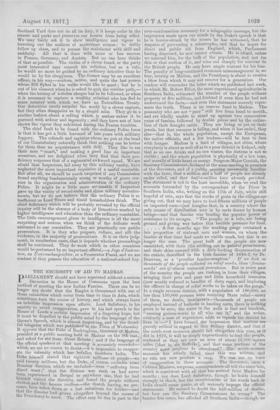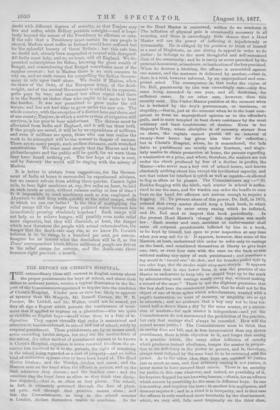THE NECESSITY OF AID TO MADRAS.
PARLIAMENT should not have separated without a serious discussion in the House of Commons upon the best method of meeting the new Indian Famine. There can be no longer any doubt that the Empire is threatened with one of those calamities which occur from time to time in Asia, which sometimes turn the course of history, and which always leave
i
an indelible impression upon affairs. Lord Salisbury, in his anxiety to avoid exaggeration, gave in his last speech in the House of Lords a certain impression of a lingering hope, but it must be dispelled in the public mind by the language of the Queen's Speech, which is almost despairing, and by the dread- ful telegram which was published in the Times of Wednesday. It appears that the Duke of Buckingham, Governor of Madras, presided at a public meeting held in Madras on the 9tli inst., and asked for aid from Great Britain ; and if the language of the official speakers at that meeting is accurately recorded— which we see no reason to doubt—it is impossible to exagger- ate the calamity which has befallen Southern India. The Duke himself stated that eighteen millions of people—we said twenty millions, but the Duke, of course, excludes some Bombay districts which we included—were " suffering from direct want ;" that the distress was such as had never been experienced in Bengal or anywhere else, that he had himself visited the districts, and found the people without clothes and the houses roofless—the thatch having, we pre- sume, been taken down as a last substitute for fodder—and that the disaster had grown altogether beyond the means of the Presidency to meet. The effect may be due in part to the over-condensation necessary for a telegraphic message, but the impression made upon our minds by the Duke's speech is that he is horror-struck by the scenes he has witnessed, that he despairs of preventing a catastrophe, and that he hopes for direct and public aid from England, which, Parliament having dispersed, he now cannot obtain. He is afraid, unless we misread him, for the bulk of the population, and not for this or that section of it, and cries out sharply for succour to the British people. He may have ample warrant for his fear. The penalty of long-continued economic mismanagement is, we fear, coming on Madras, and the Presidency is about to receive a blow from which it may not recover for a generation. Our readers will remember the letter which we published last week, in which Mr. Robert Elliot, the most experienced agriculturist in Southern India, estimated the number of the people without property at five millions, and doubted if even then he had not undertoned the facts,—and even this statement scarcely repre- sents the truth. There is no reserve fund in Madras. The- peasantry who are not " poor " still live from hand to mouth,, and are wholly unable to stand up against two consecutive years of famine, followed by double prices and by the extinc- tion of their draught cattle. They are living as yet on their jewels, but that resource is failing, and when it has ended, they also—that is, the whole population, except the Europeans, the native officials, and a few traders—will be face to face with hunger. Madras is a land of villages, not cities, where. everybody is about as well off as in a poor district in Ireland, only that as no one drinks and no one wastes, the distress is not so visible ; and the whole population is physically of a low tone, and morally of little heart or energy. Surgeon-Major Cornish, the Sanitary Commissioner, declared at the same meeting in presence of the Governor, and of a public meeting necessarily familiar with the facts, that a million and a half of people are already under relief, and that half-a-million have already perished. The statement is not in the least incredible, when we read the accounts forwarded by the correspondent of the Times in Southern India, who, writing on the 17th of July, while still. hopeful of rain, says that the stocks of grain in the villages are- giving out, that we may have to feed fifteen millions of people • on imported corn—just imagine that, in a country whore the only means of distribution now is by carts drawn by human beings—and that famine was beating the popular power of resistance to its ravages. " The people, as a rule, are losing ground and giving way before this terrible pressure for food.. A few months ago the working gangs contained a fair proportion of stalwart men and women, on whom the' famine at that time had made no visible mark, but this is no. longer the case. The great bulk of the people are now emaciated, with their ribs sticking out in painful prominence, and their skins covered with a dirty-looking disquamation of the cuticle, described in the Irish famine of 1846-7, by Dr. Donovan, as a peculiar famine-eruption.' If we look at thousands of the people collected on relief works, these famine- marks' are of almost universal prevalence. But in every part of the country the people are rushing in from their villages, bringing their pots and pans and little household treasures (now mostly reduced to bundles of dirty rags), and imploring the officers in charge of relief works to be taken on the gangs." In a single revenue district, with a population of 180,000, no less than 150,000 persons were receiving State relief—many of them, no doubt, immigrants—thousands of people are employed instead of bullocks in hauling carts, there is nothing green to be seen, the water in the wells is foul and brackish, " causing guinea-worm to all who use it," and the writer, evidently a man of experience, adds, as regards the district he lives in :—" I have formed the impression that matters are gravely critical in regard to this Bellary district, and that if the south-west monsoon should fail altogether this year, as it did in 1876, it will be simply impracticable to feed the people, scattered as they are over an area of about 12,000 square miles [that is, six Suffolks], and that some portions of the country must perforce be abandoned." The south-western monsoon has utterly failed since this was written, and no rain can now produce a crop. We can see no trace of exaggeration in these accounts. The Governor, once a Cabinet Minister, surgeons, correspondents all tell the same tale, which is consistent with all that has arrived from Madras for months ; nor does Lord Salisbury, though he holds himself strongly in check, lest the reverberation of his words back in India should cause panic, at all seriously impugn the official statements. Ho seemed to doubt the half-million of deaths, but how can the Sanitary Commissioner be wrong The famine has come, has affected all Southern India—though no
doubt with different degrees of severity, so that Tanjore may live and suffer, while Bellary perishes outright—and is hope- lessly beyond the means of the Presidency to alleviate or cure. If the rule that a Presidency must sustain its own people is obeyed, Madras must suffer as Ireland would have suffered but for the splendid bounty of Great Britain ; but this rule has, we doubt not, already been suspended or treated with disregard. All India must help, and so, we trust, will all England. We de- precated subscriptions for Behar, knowing the great wealth of Bengal, and remembering that Bengal contributes most of the surplus revenue ; but in Madras there is no such resource to rely on, and no such reason for compelling the Indian Govern- ment to rely upon itself alone. We doubt if Madras, when its share of the Debt, of the European Army, of the dead- weight, and of the central Government is added to its expenses, quite pays its way, and cannot too often repeat that there is in the South no richer class who ought to be made to bear the burden. It was not permitted to grow under the old tenure, and has not had time to grow under the new one. The whole country, with the exception of a district here and there, an d of one county, Tanjore, in which a native system of irrigation still survives, is too poor to bear misfortune. The distress must be alleviated from India and England, and it will tax them both. If the people are saved, it will be by an expenditure of millions, and even if millions are spent, those who can best realise the work to be attempted will be the nearest to despair of success. There are so many people, such endless distances, such wretched constitutions. We trust most deeply that the Mayors and the philanthropists and the public will he quick, for we warn them they have heard nothing yet. The last hope of rain is over, and by January the world will he ringing with the misery of Madras.
It is better to abstain from suggestions, for the Govern- ment of India at home is surrounded by experienced advisers, but we cannot refrain from adding three queries. Cannot light rails, to bear light machines at, say, five miles an hour, be laid on such roads as exist, without ruinous outlay or loss of time ? Is it impossible to send machinery such as was employed in Abyssinia to sink deep wells quickly at the relief camps, wells in which no one can bathe ? Is the idea of multiplying the relief camps till the danger from polluted water becomes less immediately pressing absolutely hopeless ? Such camps will not help us to relieve hunger, will possibly even make relief more expensive, but they will diminish, at least, the danger which now threatens the people with actual extermination, the danger that the death-rate may rise, as we know Dr. Cornish believes it to be rising, to a hundred per cent. per annum. Imagine for an instant what the desolation will be if, as the Times' correspondent hints, fifteen millions of people are driven to the relief camps for succour, and the death-rate there becomes eight per-cent. a month.



































 Previous page
Previous page